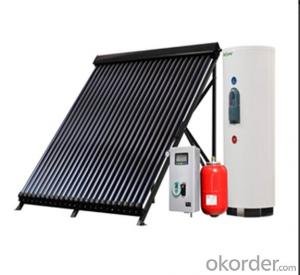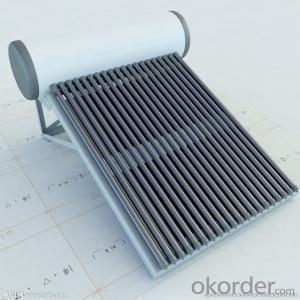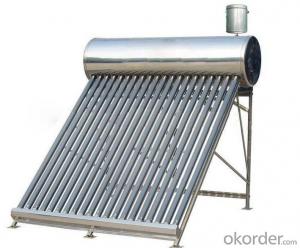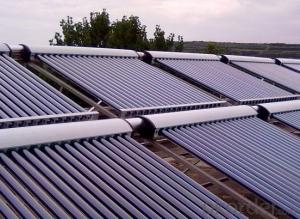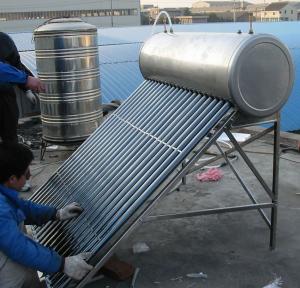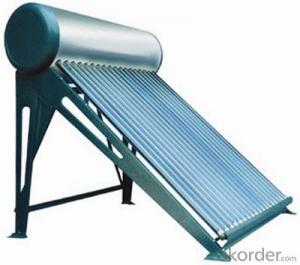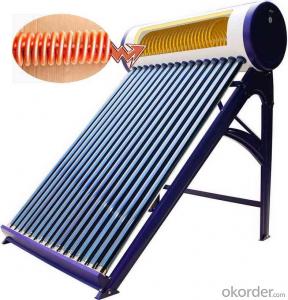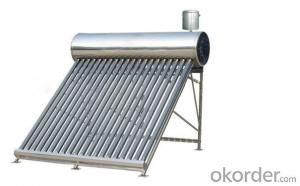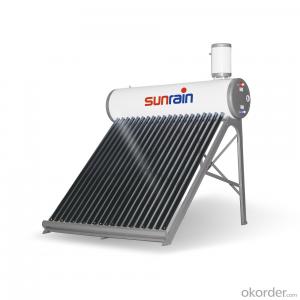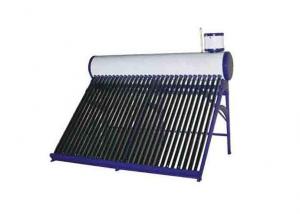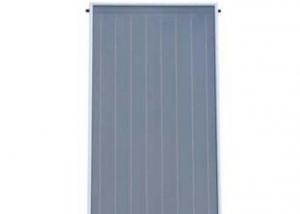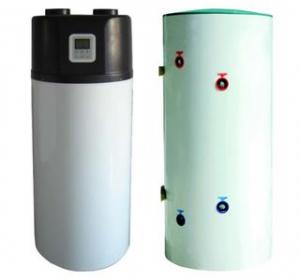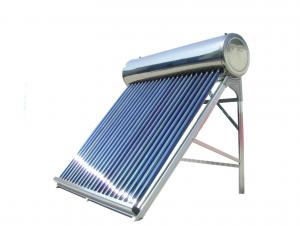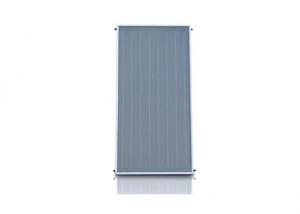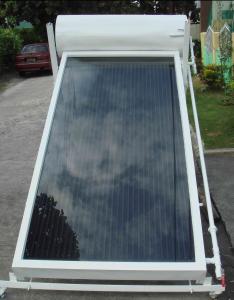Heat Exchanger Solar Water Heater (HYV8) - New Stainless Steel Non-Pressurized Model
- Loading Port:
- China Main Port
- Payment Terms:
- TT or LC
- Min Order Qty:
- 20 Set set
- Supply Capability:
- 2000 Sets per Month set/month
OKorder Service Pledge
OKorder Financial Service
You Might Also Like
Detailed Product Description
*Latest style & Hot sale style
*material of inner & outer tank: stainless steel SUS-2B 304
*automatically water supply
*Non-pressurized Solar Energy Water Heater
(It is specially designed for the acid rain area, since it is stainless steel outer tank material .
*SUS304-2B stainless steel inner tank material(310mm/360mm diameter, thickness:0.4mm )
*SUS304-2B stainless steel outer tank matetial(420mm/460mm diameter thickness:0.4mm)
*50mm/55mm thickness insulation with polyuthane foaming
*Capacity: 100L 150L 200L 300L etc
*assistant tank:5L
*SUS304-2B stainless support stand
*support angle: 27 / 45/ etc
*Vacuum tube style: Three-target & sealed glass style
*Vacuum tube size: 47*1500mm, 58*1800mm
*specific absorption: as=090-0.94
*average heat loss coefficient : Ult 0.6W
*Resistence to rain hail & acid rail
*easy installation
*lifespan: 15 years
*10 years warranty
- Q: Can a solar water heater be used to heat swimming pools?
- Yes, a solar water heater can be used to effectively and efficiently heat swimming pools. Solar water heaters harness the energy from the sun to heat water, and this heat can be transferred to the swimming pool through a circulation system. By utilizing solar energy, it is a sustainable and cost-effective way to maintain a desired temperature in a swimming pool.
- Q: How does the efficiency of a solar water heater change with different solar panel technologies?
- The efficiency of a solar water heater can vary depending on the type of solar panel technology used. Different solar panel technologies have different capabilities in harnessing and converting solar energy into usable heat for water heating. One common type of solar panel technology used in solar water heaters is flat-plate collectors. These collectors typically have a lower efficiency compared to other advanced technologies. Flat-plate collectors are made up of a dark-colored flat plate that absorbs solar radiation and transfers the heat to a fluid running through it. The efficiency of flat-plate collectors can be influenced by factors such as the angle and orientation of the panel, the amount of sunlight available, and the heat loss from the collector. On the other hand, evacuated tube collectors are another type of solar panel technology used in solar water heaters that can provide higher efficiency. These collectors consist of rows of glass tubes, each containing an absorber plate that absorbs solar radiation and converts it into heat. The vacuum-sealed tubes minimize heat loss, making them more efficient in capturing and retaining solar energy. Evacuated tube collectors can perform well even in colder climates or under low sunlight conditions. Furthermore, there are also hybrid solar panel technologies available. These combine different technologies, such as photovoltaic (PV) panels and thermal collectors, to improve overall efficiency. Hybrid solar water heaters can generate electricity from the PV panels while simultaneously using the excess heat produced for water heating, maximizing the utilization of solar energy. In summary, the efficiency of a solar water heater can vary based on the solar panel technology utilized. While flat-plate collectors are common, they generally have lower efficiency compared to advanced technologies like evacuated tube collectors or hybrid systems. The choice of solar panel technology should be carefully considered to ensure optimal performance and efficiency in harnessing solar energy for water heating.
- Q: What is the expected performance of a solar water heater in areas with high levels of air pollution from vehicles?
- The expected performance of a solar water heater in areas with high levels of air pollution from vehicles may be slightly reduced compared to areas with cleaner air. The air pollution can potentially block some sunlight from reaching the solar panels, reducing their efficiency in converting sunlight into heat energy. However, the overall impact on performance will depend on the severity and frequency of pollution episodes, as well as the maintenance and cleaning practices of the solar water heater. Regular cleaning and maintenance can help mitigate the effects of air pollution on the system's performance.
- Q: What is the warranty on a solar water heater system?
- The warranty on a solar water heater system can vary depending on the manufacturer and the specific model, but it typically ranges from 5 to 10 years.
- Q: The heating device is a manufacturer with, or the dealer?Charged safe
- Is the factory with the uncharged and charged too much power, it is better to buy a live, plus a 40 liter water heater, three, solar heat without heating electric water heater, heat heating electric water heater to wash. Most power-saving.You buy a brand of electric water heater on the safe, such as Haier, Sacon, there are anti electric wall. Very safe. If you can buy a Taobao in the county or the city of Connor, Sacon is a product line, good quality and low prices. Take a look at yourself.
- Q: The solar water heater if the direct use of groundwater for a long time, the internal pipeline can be blocked because of scale increase. Is there any good way to rust it?
- 2, add some clean water, then rinse rinse a drained, so repeated several times, thoroughly rinsed after removing a clean, all after cleaning, into the water tank, water tank, water wash sundries;
- Q: Can a solar water heater be used for heating water for industrial purposes?
- Yes, a solar water heater can be used for heating water for industrial purposes. Solar water heaters use the energy from the sun to heat water, and their efficiency can be increased by using larger collectors and storage tanks. By scaling up the system size and integrating it with industrial facilities, solar water heaters can effectively provide hot water for various industrial processes such as cleaning, sterilization, and preheating water for boilers.
- Q: Can a solar water heater be used in conjunction with a rainwater harvesting system?
- Yes, a solar water heater can be used in conjunction with a rainwater harvesting system. The rainwater can be collected, stored, and then used as the water source for the solar water heater. This combination allows for an environmentally friendly and sustainable way to heat water using renewable energy sources.
- Q: Can a solar water heater be used to heat water for agricultural purposes?
- Yes, a solar water heater can be used to heat water for agricultural purposes. Solar water heaters use energy from the sun to heat water, which can then be used for various applications, including irrigation, livestock watering, or greenhouse heating in agricultural settings. This renewable and cost-effective solution can help farmers reduce their reliance on traditional energy sources and lower their operational costs.
- Q: Can a solar water heater be used in areas with limited access to oil infrastructure?
- Areas with limited access to oil infrastructure can utilize solar water heaters. These devices use sunlight to heat water, eliminating the need for oil or other fossil fuels. As an alternative to traditional methods that rely on oil or gas, solar water heaters are sustainable and renewable. Solar water heaters are composed of solar collectors that absorb sunlight and convert it into heat, as well as storage tanks for storing the heated water. They can be installed on rooftops or in open spaces, making them suitable for areas with limited oil infrastructure. In fact, solar water heaters are particularly advantageous in areas where oil infrastructure is scarce or unreliable. They offer a consistent and cost-effective source of hot water, reducing reliance on imported fossil fuels and lessening the environmental impact associated with oil extraction, transportation, and combustion. Furthermore, solar water heaters require minimal maintenance and have a long lifespan, making them a practical solution for areas with limited resources and infrastructure. They significantly reduce energy costs and contribute to the overall sustainability of communities by utilizing clean and abundant solar energy. Overall, solar water heaters present a viable and efficient option for areas lacking in oil infrastructure. They provide a sustainable, renewable, and cost-effective means of heating water without depending on fossil fuels, ultimately contributing to the creation of a greener and more resilient energy system.
1. Manufacturer Overview
| Location | Zhejiang,China (Mainland) |
| Year Established | 2004 |
| Annual Output Value | US$10 Million - US$50 Million |
| Main Markets | North America; South America; Southeast Asia; Africa; Oceania; Mid East; Western Europe |
| Company Certifications | ISO 9001:2000 |
2. Manufacturer Certificates
| a) Certification Name | |
| Range | |
| Reference | |
| Validity Period |
3. Manufacturer Capability
| a) Trade Capacity | |
| Nearest Port | |
| Export Percentage | 61% - 70% |
| No.of Employees in Trade Department | |
| Language Spoken: | |
| b) Factory Information | |
| Factory Size: | 5,000-10,000 square meters |
| No. of Production Lines | 8 |
| Contract Manufacturing | OEM Service Offered |
| Product Price Range | |
Send your message to us
Heat Exchanger Solar Water Heater (HYV8) - New Stainless Steel Non-Pressurized Model
- Loading Port:
- China Main Port
- Payment Terms:
- TT or LC
- Min Order Qty:
- 20 Set set
- Supply Capability:
- 2000 Sets per Month set/month
OKorder Service Pledge
OKorder Financial Service
Similar products
Hot products
Hot Searches
Related keywords







